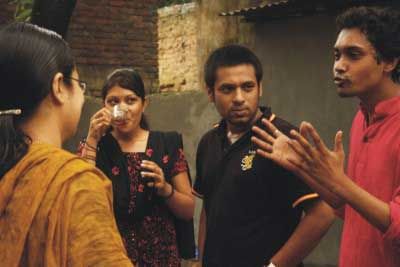Towards reaping demographic dividends

Photo: Amdadul Huq/ Drik News
The BPL cricket festival and the month-long observance of Ekushey February at some point coincided with each other. This generated interesting, if provocative, comments from young men and women. Several of them pointed to a cultural disconnect between the two events: "copycatting of IPL" in the festive inauguration of the cricketing event stood in contrast to the solemn ambience associated with the Ekushey observances.
They are not, however, clearly in a majority; for most of them saw it as a mere coincidence and not a conjunction of occasions by any celestial conspiracy. The scale of opinion was heavily tilted against the critics, most people endorsing the BPL proponents' argument that the cricketing festival and the historic Ekushey should be seen in their own contexts.
The first is chatpati cricket in short format that leaves little to imagination. It is more of an exciter than a soul-stirrer, a big "beehive of business," as it were; some taking bites while others collecting honey. The principle of auctioneering (read incentivising to taste!) players and that of franchise for stakeholders have taken the once gentleman's game to a new height of commercialisation!
Ekushey's elevated place is so emblazoned in the hearts and minds of people that it cannot admit of deflection by any passing event.
It is worthwhile to recall an interesting revelation on the steps of the language martyrs' memorial on this Ekushey. Some young men and women when approached by a television staffer to say a few words on camera about the event and its significance betrayed a sad lack of basic knowledge about the day.
Can we put on a sardonic smile at their ignorance? We have no right to; for, we the seniors are to blame for this inter-generational knowledge gap stewing in its own juice by a series of historical defaults. We have failed to provide uniform, authentic and verifiable information about most of the tuning points in our history. If there is one version, pat comes the counter or revisionist version, depending on who wields political power at a given time. Yes, some other countries may have had historical incongruities to contend with; yet they are not as obsessed as we are with memories to a point of incapacitation in terms of getting on with the present times.
It is either deification of or damning indictment on leaders without regard to their relative calibre and contributions. Distance in time usually facilitates dispassionate and objective judgment of persons and events, but in our case, understanding of fundamentals is only progressively clouded.
How much we know doesn't matter, what's really important is the sense of history and that of identity with which our children are growing to take their place in the real world around them. They are more confused than we think.
The young men and women are often disparaging in their remarks about our leaders; they cannot take pride in them nor in the circumstances and legacies the leaders have left them with. No wonder, we see the young talent leaving the country. Not so talented also left, and many did well for themselves until a couple of years back when recession had set in the host countries.
There are initial signs of a reverse migration but hardly on a scale that Indian and Chinese Diasporas are trekking back home out of deliberate choice.
The migrated have had a sense of dual identity, which is not a necessary evil if put to proper use. This has the potential for mutually reinforcing and advantageous equations in relation to both home and the adopted country.
One redeeming feature is a new genre of young men and women appearing on the scene driven by honed-up skills, ingenuity, tenacity and patriotic zeal to be acting as change agents in Bangladesh. They think leadership is all about ownership of problems and not fighting shy of them.
Taking a cue from a blogger, here is a message: We Bangladeshis better learn English thick and fast because Indians, Sri Lankans, Filipinos and Pakistanis are being employed in Bangladesh denying us positions that should have been ours. This is not based on research to be sure but it conveys the impression of an observer. A BBC survey has revealed that 69% of young respondents in Bangladesh are for learning English for jobs and understanding the world better.
Our young people, particularly since 1980 up until very recently, were launched late into their careers with many wasted years behind them. The sessions jam in the universities, only lately rolled back though, has been one major reason for our failure to reap the demographic dividends we ought to have given the size of our young people.

 For all latest news, follow The Daily Star's Google News channel.
For all latest news, follow The Daily Star's Google News channel. 



Comments